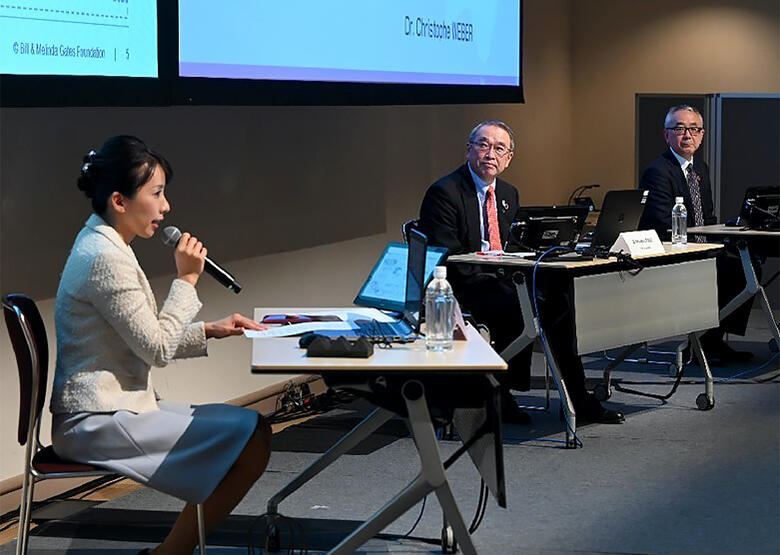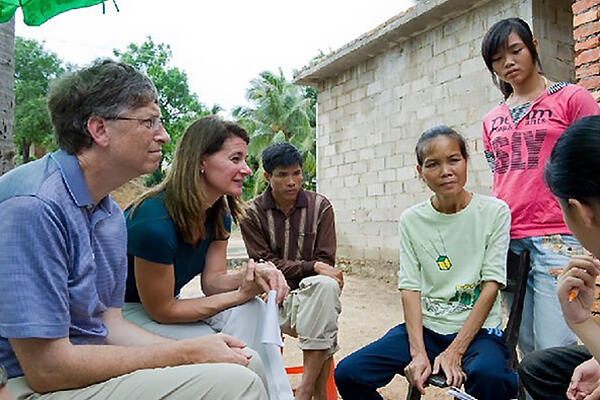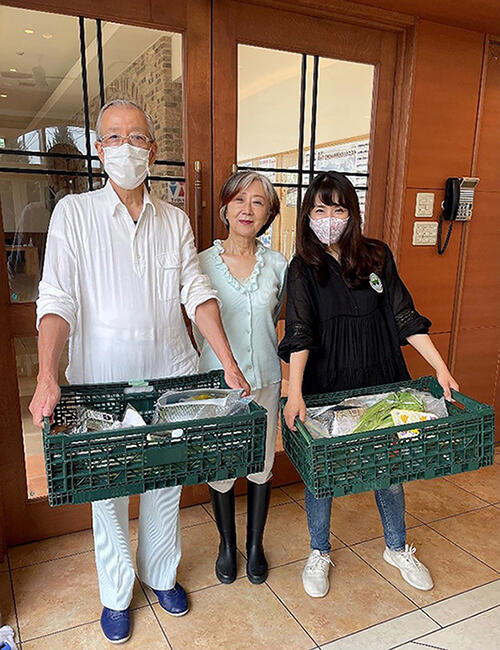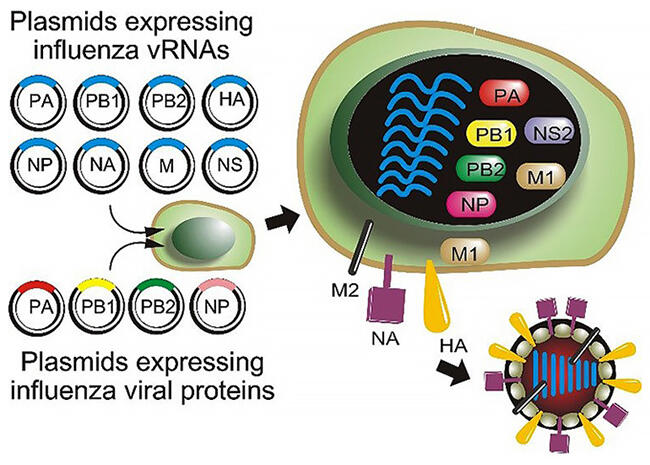
(Photo taken in 2020, provided by Mihoko Kashiwakura)
The Bill & Melinda Gates Foundation (Gates Foundation, hereafter), one of the world's largest charitable foundations, continues to provide various forms of support, particularly in the field of global health, to realize a world where "all lives have equal value." It was established in 2000 by Microsoft founder Bill Gates and his former wife, Melinda French Gates (the foundation has had a presence in Japan since 2017). The foundation has also been involved in setting up various support frameworks to promote collaboration with partners worldwide to overcome the difficulties posed by the coronavirus (Covid-19) pandemic. Mihoko Kashiwakura, the foundation's Head of East Asia Relations at the Bill& Melinda Gates Foundation spoke to us about the issues that have become clearer through its work and their plans around future contributions.
Launch of a Global Organization Based on Multilateralism
― The world is now facing the challenge of fighting Covid-19. What initiatives has the Gates Foundation undertaken to address this issue?
Kashiwakura (same hereafter):
In April 2020, when the Covid-19 pandemic came to the fore, we quickly launched a global organization called the ACT-Accelerator with the World Health Organization (WHO) and others. It is a multi-faceted platform that focuses on equity, delivering vaccines, therapeutics and diagnostics to countries in need. It embodies multilateralism, which the foundation places great importance in, and strategically considers the pandemic's worldwide convergence. We are trying to create a pipeline for delivering the necessary amount of vaccines, test kits and therapeutic agents to countries where they are needed, while examining the entire world in a fair and scientific way.

(© Bill & Melinda Gates Foundation/Lou Linwei)
― What kind of contribution is Japan making to global-scale issues?
One of the principal pillars of the ACT-Accelerator is vaccines. In September 2020, when the COVAX Facility, a global scheme that aims for the equitable distribution of Covid-19 vaccines, had just been set up, the Japanese government was the first developed country to express its readiness to get involved. Today, more than 190 countries and regions participate in COVAX, but the Japanese government, which emphasizes multilateralism, was actually a crucial player at a time when other developed countries were on the path towards vaccine nationalism.
At the COVAX Vaccine Summit co-hosted by the Japanese government in June 2021, Japan announced that it would contribute an additional $800 million to the previous year's $200 million, making a total contribution of $1 billion. Due to Japan's efforts, the financing outlook (based on donor pledges) for vaccines for 30% of the adult population in low- and middle-income countries by the beginning of 2022 is looking promising. The pledged countries are expected to send the funds within 2021. I feel that Japan's global leadership through its foreign policy has contributed to getting COVAX on track.
There is also the Global Health Innovative Technology Fund (GHIT Fund). It was established in 2012 with the aim of actively investing in research and development in global health through funding from the Japanese government, pharmaceutical companies, and organizations like the foundation. This fund is the world's first model case of collaboration between the public and private sectors, and many countries are interested in it. It is hugely encouraging to see that there are actually some world firsts that originated in Japan.
Taking a personal stake in crisis awareness and social issues, as understood in developed countries
― Has the Covid-19 pandemic changed the world's awareness of the risk of infectious diseases?
For the first time, developed countries experienced the fear and pain that are always present in low- and middle-income countries, such as lack of vaccines, therapeutic drugs, and access to hospitals. I believe that 2021 was the year when we understood why public health and infectious disease control are so important.
On the other hand, more than 1.5 million people worldwide died from Covid-19 in 2020, but 2.5 million people die every year from malaria, tuberculosis, and HIV (human immunodeficiency virus). It took about 30 years to develop a vaccine for malaria, but a vaccine for Covid-19 became available within a year. It goes to show when developed countries and economic giants are interested in something, it attracts attention, and funds are invested.
One of the things that Covid-19 has proven is that global society is united enough to the point where self-interests and the interests of others become one. We know through simulations of vaccine distribution that if developed countries buy up all the vaccines, the death toll will double, compared to if the vaccines are fairly distributed according to population, delaying the end to the Covid-19 pandemic. Despite this data, I feel that it has still been difficult to change perspectives, from where people only look at the issues at hand to having a more holistic view.
Yet, the fact that the vaccine became available within a year this time was due to the efforts made years before to prepare for the next pandemic. It is vital for countries worldwide to keep making huge investments to prepare for what comes next.
― "Taking a personal stake in social issues" to share crisis awareness ― What will it take to raise awareness?
I've always thought the issue of raising awareness is very challenging. In my personal capacity, I started working for a children's cafeteria in Tokyo's Adachi Ward, where there are many families in need. I now support a food delivery service mainly for single-mother households. The difficulty is that the poverty problem in Japan is not immediately apparent, and the reality of people's hardship is hidden. When I go to deliver food to such families, I am sometimes surprised to see their well-kept houses, which makes me realize that the background of the issue is becoming more complex. I feel that Japanese people are so conscious of their self-responsibility that they may not raise their voices to ask for help.

(Photo taken in 2021, provided by Mihoko Kashiwakura)
Another comment I can make is that Japan's NGO (non-governmental organization) sector is still small compared to Europe and the U.S., making it difficult for the perspectives and voices of the citizens who are suffering the most to reach the government through policy proposals. The NGO sector, which is supposed to play an important role in making society healthy through creating democracy, has not been able to fulfil its role to the fullest extent. Because poverty and social issues in Japan are easily hidden, donations to NGOs are inordinately lower in Japan than in Europe and the U.S. I think a donation model that suits Japanese culture and identity has yet to be found. The combination of various bottlenecks has created a structure that makes it difficult to see the social problems at hand in Japan.
I would like more people to learn about the various NGO activities and participate in them. It will be an opportunity to take a personal stake in the issues and help them understand that there are many social issues across our daily lives in Japan.
Strength in planning based on data and scientific evidence
― To solve social issues, I think it is necessary to collaborate with various stakeholders. What kind of collaboration is possible because of the Gates Foundation?
I believe that global health issues are significant challenges that cannot be solved by a single foundation, organization or sector and that finding solutions takes time. We work with our partners worldwide to gather data and information on needs on the ground, connect various sectors such as the public and private sectors, and make investments into impactful research and development.
What makes our organization a little unusual is that, from the perspective of Bill Gates, who is a businessman himself, we have a business-like strategy that seeks results and planning based on data and scientific evidence, which has automatically become a strength of the organization.
In 2000, the same year the foundation started, Gavi, the Vaccine Alliance (Gavi) was established, which Bill Gates was involved in, too, to deliver various vaccines to 60% of the world's children. What makes Gavi different from previous international cooperation is that it is a new model of public-private partnership in which national governments, private companies, U.N. agencies, and NGOs collaborate to create an alliance.
Until then, the governments of low-income countries negotiated vaccine prices with pharmaceutical companies individually, but Gavi formed a vaccine market for 73 low-income countries worldwide, creating a win-win situation for both the governments and the private sector. As a result, some vaccine brands' prices dropped by nearly 37%. At the end of the day, I think that collaboration with the private sector was crucial in creating the optimal market formation model for delivering vaccines at a price range that matches each country's level of economic development.
Pharmaceutical companies were then able to engage in medium- to long-term vaccine development and invest more R&D funds even in low-priced vaccine brands that do not necessarily generate profits. Leveraging such experiences, I think we can continue to solve global health issues through multi-sectoral collaboration.
― How do you find optimal partners for collaboration?
The foundation hires people from a variety of backgrounds. The sector experts, be it in HIV, malaria or vaccine development, search extensively and globally for those working on research projects that are likely to have the most significant impact.
On the other hand, our organization does not deal with medical issues in developed countries or high-income countries. It focuses exclusively on low- to middle-income countries, and I think this narrow focus is what allows us to track the latest trends.
Every three to five years, each department of the foundation presents a mid- to long-term strategy to the foundation's leadership, including the co-chairs, Bill and Melinda. They look at whether those strategies are validated with data, what the bottlenecks are, and what areas the foundation needs to invest in. From there, a clear strategy that includes numerical targets will be issued. For example, the targets can call for malaria reduction in a particular area by a certain amount or, say, improvement on malnutrition in a particular area by a certain amount.
So, whether the strategy gets approved or not as well as the budget depends on how solid the strategy is. It becomes clear what to invest in and what not to invest in; we look for the "best of science" from that perspective.
Supporting researchers working on making the world a better place
― Among the various partnerships you mentioned, could you share any good examples of collaboration with Japanese researchers?
One example is that we contribute approximately 1.9 billion yen of funding to cover research costs for a clinical epidemiology project on pediatric pneumococcal vaccines conducted in Vietnam by Professor Lay Myint Yoshida of Nagasaki University.
Pneumococcal infections are one of the main causes of children's death. Nevertheless, the vaccine price per unit is high, and on top of that, the number of doses is also high: four in Japan and three in the U.K., costing Gavi and low- and middle-income countries fortunes. Prof. Yoshida's research is an attempt to make vaccines that are both effective and efficient.
Delivering vaccines to developing countries is a massive challenge in terms of financial resources and logistics. Still, if the research can be applied to reduce the number of times various vaccinations have to be administered, it will be an asset that will significantly impact the world.
We also support a project by Yoshihiro Kawaoka, Project Professor at the University of Tokyo, a world authority on influenza research. It is no exaggeration to say that even though influenza is this century's most significant infectious disease, we are still in a situation where each country collects viruses to predict the most virulent strains to prepare vaccines every year. Prof. Kawaoka aims to produce a universal vaccine to provide immunity to a wide range of strains with a single vaccination. We believe that this research will also have a very high impact.

(Provided by Prof. Kawaoka)
The foundation is also a sponsor of the Vision Hacker Award, a program run by an NPO called ETIC, to support people who use their vision to change the current state of the world. Like Bill and Melinda, the award recipients also realize their visions of the future they want to create, and I genuinely think that everyone's thoughts shape the world.
― Lastly, could you please give a message to the scientific community and young researchers?
The researchers supported by the foundation have a clear viewpoint on how their research will change the world. If young researchers conduct research while always picturing how to make the world better, their chance of collaborating with various companies or organizations will increase.
The foundation has great expectations for Japan, which has produced many of these kinds of researchers over the years. I would like researchers to showcase Japan's strengths to the world by forming partnerships that allow them to experience social issues firsthand and share their findings globally as early as possible.

KASHIWAKURA Mihoko
Head of East Asia Relations, Bill & Melinda Gates Foundation
After graduating from Keio University's Faculty of Policy Management, she earned an MBA from Cambridge Judge Business School, University of Cambridge, and completed an Executive Master of Global Leadership Fellowship from the World Economic Forum. Having built a career in investment banking and responsible investment, she joined the World Economic Forum in 2013 as its first staff member in Japan, in charge of regional strategy. She has been in her current position since July 2017 and is responsible for scaling up the number of solutions from Japan that tackle challenges in developing countries.
(OTORI Chikako, Freelance Writer)
Original article was provided by the Science Portal and has been translated by Science Japan.




